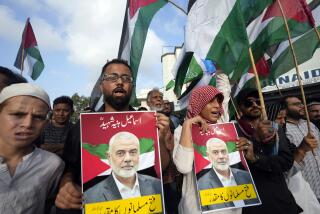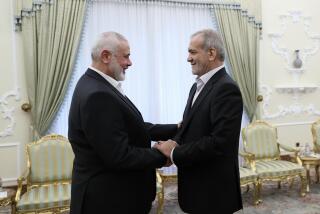Key ANC Negotiator Assassinated in S. Africa : Violence: Chris Hani’s murder threatens to undermine constitutional talks and raises fears of a bloody township uprising.
- Share via
BOKSBURG, South Africa — In a severe blow to the peace process in South Africa, Chris Hani, a key African National Congress negotiator and hugely popular black leader, was shot dead Saturday in the driveway of his home by a white assassin.
Hani, 50, a member of the ANC’s top policy-making body and general secretary of the ANC-aligned Communist Party, was attacked when he returned to his rose-brick home in this quiet, multiracial suburb of Johannesburg after a morning errand to buy two newspapers. He parked, got out of his car and was shot four times from behind.
Neighbors who heard the gunshots and saw the assailant’s car roar away telephoned police, who arrested Januzu Jakub Wallus, a 40-year-old Pretoria man, a few miles away. Wallus had two revolvers in his car, police said.
Wallus, who came to South Africa from Poland 10 years ago, has violently anti-Communist views and also has links to the far-right Afrikaner Resistance Movement, the Sunday Times newspaper in Johannesburg reported today.
Hani’s assassination marked the first slaying of a high-ranking anti-apartheid leader in South Africa’s troubled history.
It sent shock waves across the country’s political spectrum Saturday, threatening to undermine recently resumed constitutional negotiations and raising fears of a bloody township uprising. In a township near Cape Town on Saturday, police said angry blacks erected burning barricades in the streets and burned several houses.
“This is real madness,” said a somber Desmond M. Tutu, the Anglican archbishop of Cape Town and winner of the 1984 Nobel Peace Prize. “I just want to cry for our country. Of all the ANC leaders, maybe all the political leaders we have, he (Hani) had the credibility among the young to rein in the radicals.
“Clearly, someone wants to do all they can to sabotage the negotiations,” Tutu said. And he urged blacks not to allow their anger to turn violent. “Don’t let this tragic event trigger reprisals,” he said.
ANC President Nelson Mandela, in an unprecedented address to the country on state-run television, called Hani “one of the greatest freedom fighters this country has ever known.”
“We are a nation deeply wounded by uncaring men who plot such heinous crimes with impunity,” Mandela said. “Our pain and anger is real. Yet we must not permit ourselves to be provoked by people who seek to deny us the very freedom for which Chris Hani gave his life.”
In a statement, Mandela added, “With all the authority at my command, I appeal to all our people to remain calm and to honor the memory of Chris Hani by remaining a disciplined force for peace.”
President Frederik W. de Klerk, expressing shock at the killing, also urged restraint. “He (Hani) and I were at opposite poles of the political debate, but we were both prepared to resolve the problems of our country through peaceful negotiations,” De Klerk told the nation in a TV broadcast.
In Washington, the State Department condemned the assassination as “a deplorable and troubling event.” A statement said the killing underscores the need for negotiations to dismantle apartheid in South Africa.
Hani’s death was a devastating blow to the ANC, which had come to rely on him in recent months to persuade the tens of thousands of militant black youths who idolized him to accept negotiations and end their talk of violence.
During most of his 28 years in exile, ending with his return in 1990, Hani was beloved by militant blacks and deeply feared by whites. He was chief of staff of the ANC’s military wing during much of the turbulent 1980s, resigning a year ago to become head of the Communist Party.
His significant role in keeping South Africa’s fragile black-white negotiations afloat did not depend on his titles but rather on his strong following among the impoverished and angry township youth. Many of those young blacks support the ANC but are wary of negotiations with the white-minority government. But they had been willing to go along with constitutional talks as long as Hani was involved.
“I feel that we have achieved something in this country,” Hani told his supporters recently. “Those who have oppressed us are finally talking to us and are showing willingness to change. Now I’m saying that every member of the ANC should be a fighter for peace.”
A few days before his death, Hani also criticized neighborhood “self-defense units,” composed of ANC members. He said the units were growing out of control, committing crimes in the name of the anti-apartheid struggle and hampering the chances for peace and black liberation in South Africa.
The assassination occurred shortly after 10 a.m. in Dawn Park, a small subdivision of middle-class homes in Boksburg, about 15 miles east of Johannesburg.
Hani, his wife and three teen-age daughters had moved into their three-bedroom, $50,000 home, surrounded by a 6-foot brick wall, 18 months ago. Hani was well-known in the area and he often jogged on the quiet streets, smiling and waving to his black and white neighbors.
Although he had a retinue of bodyguards, Hani often was alone, neighbors said, and the ANC said Saturday that Hani had given his guards the day off to be with their families.
Saturday morning, Hani called a friend, Mondla Gungubele, and they made plans to take his 14-year-old daughter to a beauty salon in a nearby township later in the day. Then he drove alone in his Toyota to a local store to buy the morning newspapers. When he returned, he parked in the open driveway.
As he did so, a white motorist stopped on the street behind him. As Hani was locking his car door, the assailant walked toward him and fired twice from a few feet away, knocking the ANC leader to the ground. Then, witnesses said, the man approached the fallen Hani and fired two more shots into his head.
ANC leaders and friends gathered at the house throughout the day Saturday, wiping away tears and talking of their fallen colleague. Many ANC officials blamed the killing on the government and its past policies of apartheid, which had spawned generations of racist whites. And they expressed concern about their ability to control Hani’s youthful followers.
“I don’t know what we are going to tell these youth now,” said Hani’s friend, Gungubele, a 36-year-old regional ANC official. “It’s going to be difficult. If they kill somebody who is fighting for peace, who are they not going to kill?”
Martin Thembisile Hani was a reluctant soldier for the ANC. He was born into poverty in the rural Transkei area of South Africa in 1942, the son of a migrant farm worker. He graduated from Rhodes University with a degree in English and Latin, and he was a lifelong devotee of Shakespeare and the romantic poets, with a particular passion for the music of Barbra Streisand.
He joined the ANC’s military wing, was arrested in 1962 for subversion and sentenced to 18 months in jail. When his appeal was denied, however, he jumped bail and left the country to undergo military training.
During the 1970s and early 1980s, he moved to Lesotho, the tiny mountain kingdom surrounded by South Africa, and established ANC units inside South Africa. Pretoria agents twice tried to assassinate him in Lesotho, but each time he escaped without injury.
Many of Hani’s colleagues were surprised when, 15 months ago, he quit as chief of staff of the ANC’s army to take over as general secretary of the Communist Party, a much smaller organization beset by recruiting difficulties and ideological disputes.
Although he maintained his positions on the ANC’s national executive committee, and its elite national working committee, Hani’s decision to devote himself to the Communist Party spoiled any hopes he might have had of a top Cabinet position in a post-apartheid government.
Hani said his allegiance to socialism had less to do with ideology than with the social injustice he and his family had experienced at the hands of apartheid.
Profile: Chris Hani South African black leader Martin Thembisile Hani was assassinated at his suburban Johannesburg home Saturday. A look at his life and career. Born: June 28, 1942, at Cofimvaba, Transkei. Son of a migrant farm worker active in the African National Congress and nephew of a Communist Party activist. Education: Attended a Roman Catholic primary school, where he decided to become a priest, which was forbidden by his father. Attended Fort Hare University but was suspended for political protest in 1961. Graduated from Rhodes University in 1962 with a bachelor’s in Latin and English. Career highlights: Joined ANC Youth League in 1957; joined ANC’s military wing Umkhonto we Sizwe (Spear of the Nation) and Communist Party in 1962. Sentenced to 18 months in jail under Suppression of Communists Act and went underground after losing appeal in 1963. Underwent military training abroad and established ANC units in South Africa. Returned to South Africa in February, 1990, after bans were lifted on ANC, Communists and other opposition groups. Family: Survived by wife, Limpho Hani, and three daughters.
More to Read
Sign up for Essential California
The most important California stories and recommendations in your inbox every morning.
You may occasionally receive promotional content from the Los Angeles Times.













